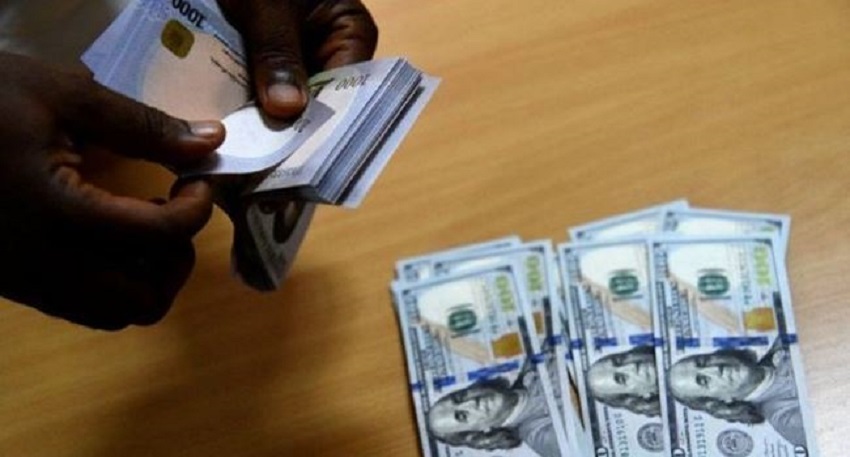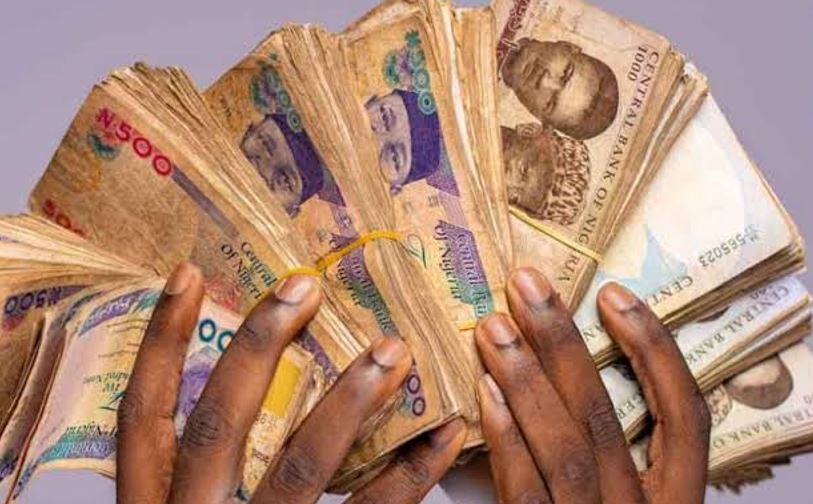Economy
CBN Killing Naira Value With Inhibitive Policies—ABCON

By Dipo Olowookere
The Association of Bureaux de Change Operators of Nigeria (ABCON) has taken a swipe at the Central Bank of Nigeria (CBN) over the depreciating value of the local currency.
The President of ABCON, Mr Aminu Gwadabe, in an interview with The Punch, said some of the regulatory policies of the apex bank are affecting the Naira value in the foreign exchange (FX) market.
He said, for example, the running of more than one forex regime in Nigeria was decreasing the inflow of foreign currencies as the gap between the official exchange rate at N416/$1 and the black market at N600/$1 was too wide.
Mr Gwadabe also said the amount needed to obtain a licence to operate as an International Money Transfer Operator (IMTO) is not the same for local and foreign operators.
“There are a lot of inhibitive regulatory policies. In Nigeria now, for you to say you have a licence to operate as International Money Transfer Operator, the capitalisation is N2 billion for a local company.
“A foreign company comes in and gets a licence at $1 million. How much is $1 million compared to N2 billion or N600 million?
“This is for a foreign company that wants a licence of IMTO, but for a citizen, you have to cough out N2 billion? So, it is not encouraging small players,” he said.
Speaking further, he said, “The foreign exchange market is like any other market determined by market forces, demand and supply. Investors’ inflows; both the direct and the portfolio investors are not coming. Why? This is because of the existence of official and flexible exchange rates.
“No investor will want to come and say I want to give my money because I am patriotic. When Nigerians are not selling their money at the official rate, do you expect a foreigner to sell his/her money at the official rate? The same thing is applicable to diaspora remittances.
“Recently, the World Bank did repeat that Nigeria has the largest chunk of diaspora remittances out of $49 billion that came last year. Bloomberg statistics says ours is about N34 billion. So, where are all these monies?
“When you ask, they will say the money is coming in cars, clothes, and all that. That is not true. The money the NGOs are bringing into the local economy is far less than the money they are taking abroad. We want to help our people anywhere we are. Go abroad, Nigerians still send money to Nigeria but because of the multiplicity of exchange rates, you cannot see that money officially.”
As for the solutions to these issues, the ABCON leader advised the central bank to lift the ban on the sale of forex to bureaux de change (DBC) operators, saying the “overwhelming regulation and the overwhelming criminalisation are not the best.”
According to him, the group has automated its operations to reduce “unwanted behaviour because everything is transparent and accurate.”
“As an association, we have embraced technology. We have transformed our operations. We have four different platforms to automate our system, and we are calling for the urgency for allocation of diaspora remittances,” he added.
Mr Gwadabe said his members want to be “involved in the foreign remittances channel because the market is huge. Because of the monopoly, it has been an exclusive preserve of banks. They should break that monopoly. We are not even saying stop the banks, but out of the 100 per cent they are doing, even if we have 25 per cent for a start, the automation that we have in place has taken care of the security and structure needed.
“Our process has been automated and we are easily accessible to the public. In other climes, banks don’t really do some transactions. If you want to send $200 to your family, they will show you the BDC to go to. But now, banks run after a $200 customer.
“The association of the BDCs is no longer where people think we are mallams. We are a group of professionals. We can collaborate, we can give advice, and most of us are even coming from the banking industry. We are lawyers, we are engineers. The BDCs should be allowed to access dollars or diaspora remittances through the autonomous forex windows that enable operators to receive IMTO proceeds, among others.
“This is the time to break the current industry monopoly that puts the remittances market in the hands of few players depriving others of tapping into the plan,” adding that, “There is an urgent need to enhance dollar liquidity in the market and ensure the stability of prices in the economy.”
Economy
Seven Price Gainers Boost NASD OTC Bourse by 2.19%

By Adedapo Adesanya
Seven price gainers flipped recent declines at the NASD Over-the-Counter (OTC) Securities Exchange, raising the alternative stock market by 2.19 per cent on Friday.
According to data, the market capitalisation added N51.24 billion to end N2.389 trillion compared with the previous day’s N2.338 trillion, while the NASD Unlisted Security Index (NSI) climbed 85.65 points to close at 3,994.32 points, in contrast to the 3,908.67 points it ended a day earlier.
Business Post reports that the advancers were led by MRS Oil Plc, which improved its value by N13.00 to N200.00 per share from N187.00 per share, FrieslandCampina Wamco Nigeria Plc gained N7.40 to settle at N91.55 per unit versus the previous day’s N84.15 per unit, Central Securities Clearing System (CSCS) Plc appreciated by N6.08 to N71.00 per share from N64.92 per share, Afriland Properties Plc added 66 Kobo to finish at N17.17 per unit versus N16.51 per unit, IPWA Plc rose 37 Kobo to N4.15 per share from N3.78 per share, First Trust Mortgage Bank Plc grew by 11 Kobo to N1.20 per unit from N1.09 per unit, and Food Concepts Plc went up by 10obo to N3.70 per share from N3.60 per share.
On the flip side, there were two price losers led by Geo-Fluids Plc, which depreciated by 28 Kobo to N3.32 per unit from N3.60 per unit, and Industrial and General Insurance (IGI) Plc dropped 5 Kobo to sell at 45 Kobo per share from 50 Kobo per share.
Yesterday, the volume of trades went down by 92.0 per cent to 3.7 million units from 45.8 million units, the value of transactions fell by 59.4 per cent to N84.5 million from N208.2 million, while the number of deals went up by 7.7 per cent to 42 deals from 39 deals.
CSCS Plc remained the most traded stock by value (year-to-date) with 32.6 million units exchanged for N1.9 billion, trailed by Geo-Fluids Plc with 119.6 million units valued at N470.3 million, and Resourcery Plc with 1.05 billion units traded at N408.6 million.
Resourcery Plc closed the day as the most traded stock by volume (year-to-date) with 1.05 billion units sold for N408.7 million, followed by Geo-Fluids Plc with 119.6 million units worth N470.3 million, and CSCS Plc with 32.6 million units worth N1.9 billion.
Economy
FX Demand Worries Weaken Naira to N1,346/$1 at Official Market

By Adedapo Adesanya
The Naira weakened further against the United States Dollar in the Nigerian Autonomous Foreign Exchange Market (NAFEX) on Friday, February 20, by N4.97 or 0.37 per cent to N1,346.32/$1 from the N1,341.35/$1 it was transacted on Thursday.
Heightened FX demand tilted the market toward the downside yesterday, exerting upward pressure on rates despite efforts by the Central Bank of Nigeria (CBN) to stabilise the foreign exchange market.
Also in the official market, the domestic currency depreciated against the Pound Sterling during the session by N9.39 to sell for N1,815.25/£1 versus the previous day’s N1,805.86/£1, and lost N7.33 against the Euro to close at N1,584.62/€1 compared with the preceding session’s N1,577.29/€1.
The story was not different for the Nigerian Naira at the GTBank FX desk, where it depleted against the Dollar by N7 on Friday to quote at N1,356/$1 versus the N1,349/$1 it was sold a day earlier, but remained unchanged in the black market at N1,370/$1.
It was observed that risky sentiment among Foreign Portfolio Investors (FPIs) contributed to the FX market, amid fears of hot money flight due to capital gains tax and other factors.
As for the cryptocurrency market, it was mostly green yesterday in reaction to a Supreme Court verdict dismissing a fresh 10 per cent global levy by President Donald Trump.
The apex court on Friday described Mr Trump’s global tariff rollout as illegal. The decision did not clarify what should happen to tariff revenue already collected, and it doesn’t necessarily spell the end of the trade agenda, with multiple legal and executive avenues still available.
Litecoin (LTC) grew 2.7 per cent to $55.00, Cardano (ADA) appreciated 2.6 per cent to trade at $0.2815, Binance Coin (BNB) expanded by 2.6 per cent to $627.19, Dogecoin (DOGE) recouped 1.3 per cent to quote at $0.1, Ripple (XRP) jumped 0.7 per cent to $1.43, Solana (SOL) improved by 0.5 per cent to $84.15, and Ethereum (ETH) soared 0.1 per cent to $1,962.78.
However, Bitcoin (BTC) lost 0.2 per cent to sell for $67,850.49, while the US Dollar Tether (USDT) and the US Dollar Coin (USDC) traded flat at $1.00 each.
Economy
Fidson, Jaiz Bank, Others Keep NGX in Green Territory

By Dipo Olowookere
A further 0.99 per cent was gained by the Nigerian Exchange (NGX) Limited on Friday after a positive market breadth index supported by 53 price gainers, which outweighed 23 price losers, representing bullish investor sentiment.
During the trading day, the trio of Jaiz Bank, Fidson, and NPF Microfinance Bank chalked up 10.00 per cent each to sell for N11.00, N86.90, and N6.27, respectively, while Deap Capital appreciated by 9.96 per cent to N7.62, and Mutual Benefits increased by 9.94 per cent to N5.42.
Conversely, Secure Electronic Technology shed 10.00 per cent to trade at N1.62, Sovereign Trust Insurance slipped by 9.73 per cent to N2.32, Ellah Lakes declined by 7.91 per cent to N12.80, International Energy Insurance retreated by 5.56 per cent to N3.40, and ABC Transport moderated by 5.26 per cent to N9.00.
Data from Customs Street revealed that the insurance counter was up by 2.52 per cent, the industrial goods sector grew by 2.28 per cent, the banking space expanded by 1.43 per cent, the consumer goods index gained 1.23 per cent, and the energy industry rose by 0.05 per cent.
As a result, the All-Share Index (ASI) went up by 1,916.20 points to 194,989.77 points from 193,073.57 points, and the market capitalisation moved up by N1.230 trillion to N125.164 trillion from Thursday’s N123.934 trillion.
Yesterday, investors traded 820.5 million stocks valued at N28.3 billion in 63,507 deals compared with the 898.5 million stocks worth N38.5 billion executed in 61,953 deals, showing a jump in the number of deals by 2.51 per cent, and a shortfall in the trading volume and value by 8.68 per cent and 26.49 per cent apiece.
Closing the session as the most active equity was Mutual Benefits with 79.0 million units worth N427.1 million, Zenith Bank traded 44.0 million units valued at N3.8 billion, Chams exchanged 43.9 million units for N182.0 million, AIICO Insurance transacted 42.4 million units valued at N179.8 million, and Veritas Kapital sold 36.0 million units worth N90.6 million.
-

 Feature/OPED6 years ago
Feature/OPED6 years agoDavos was Different this year
-
Travel/Tourism10 years ago
Lagos Seals Western Lodge Hotel In Ikorodu
-

 Showbiz3 years ago
Showbiz3 years agoEstranged Lover Releases Videos of Empress Njamah Bathing
-

 Banking8 years ago
Banking8 years agoSort Codes of GTBank Branches in Nigeria
-

 Economy3 years ago
Economy3 years agoSubsidy Removal: CNG at N130 Per Litre Cheaper Than Petrol—IPMAN
-

 Banking3 years ago
Banking3 years agoSort Codes of UBA Branches in Nigeria
-

 Banking3 years ago
Banking3 years agoFirst Bank Announces Planned Downtime
-

 Sports3 years ago
Sports3 years agoHighest Paid Nigerian Footballer – How Much Do Nigerian Footballers Earn



















